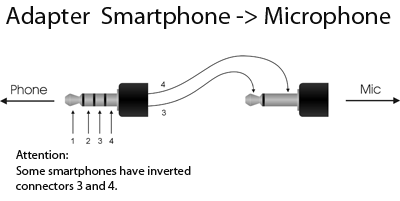Difference between revisions of "Supplementary Equipment"
(Image display corrected) |
|||
| (28 intermediate revisions by 3 users not shown) | |||
| Line 1: | Line 1: | ||
==Directional microphone== | ==Directional microphone== | ||
| − | + | For research projects with the aim to gather sound tracks in the field (e. g. [[IBF Orthoptera]]) and store them in the internal storage unit of a smartphone a directional microphone is necessary. Currently (in 2012), the head set adapters available for HTC 7 smartphones are not appropriate to connect directional microphones. | |
| + | In cooperation with Stephan Meßlinger, [http://www.ep5.uni-bayreuth.de/ University of Bayreuth, LS Experimentalphysik V], a technical solution is found to overcome this obstacle. | ||
| + | *For use of directional microphones in the DiversityMobile context users should purchase a standard head set adapter. | ||
| + | *This adapter has to be modified following the description in the connection diagram in relation to the brazing process: | ||
| + | [[File:Diagram_Adapter_Microphone_2012-04-25.png]] | ||
| − | + | *The HTC 7-Adapter modified: **** | |
| − | + | *The directional microphone currently used: [http://www.hama.de/portal/articleId*26853/action*2563 Hama Lavalier-Mikrofon LM-09] (respectively you can buy it at [http://www.amazon.de/Hama-00046109-Lavalier-Mikrofon-LM-09/dp/B00006JB4R/ref=sr_1_6?ie=UTF8&qid=1331566526&sr=8-6 Amazon]) | |
| − | + | Problem with this microphone is that the background sounds are filtered out - and with them also the orthopteran sounds. As an alternative we are trying at the moment [http://www.zoom.co.jp/english/products/h2/ Zoom H2 Recorder], with which it is possible to record the orthopteran sounds, but at the same time all background sounds. These have to be filtered out afterwards. | |
| − | |||
| − | |||
| − | |||
Latest revision as of 05:54, 28 April 2020
Directional microphone
For research projects with the aim to gather sound tracks in the field (e. g. IBF Orthoptera) and store them in the internal storage unit of a smartphone a directional microphone is necessary. Currently (in 2012), the head set adapters available for HTC 7 smartphones are not appropriate to connect directional microphones.
In cooperation with Stephan Meßlinger, University of Bayreuth, LS Experimentalphysik V, a technical solution is found to overcome this obstacle.
- For use of directional microphones in the DiversityMobile context users should purchase a standard head set adapter.
- This adapter has to be modified following the description in the connection diagram in relation to the brazing process:
- The HTC 7-Adapter modified: ****
- The directional microphone currently used: Hama Lavalier-Mikrofon LM-09 (respectively you can buy it at Amazon)
Problem with this microphone is that the background sounds are filtered out - and with them also the orthopteran sounds. As an alternative we are trying at the moment Zoom H2 Recorder, with which it is possible to record the orthopteran sounds, but at the same time all background sounds. These have to be filtered out afterwards.
